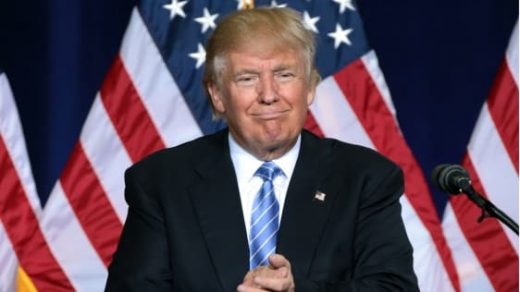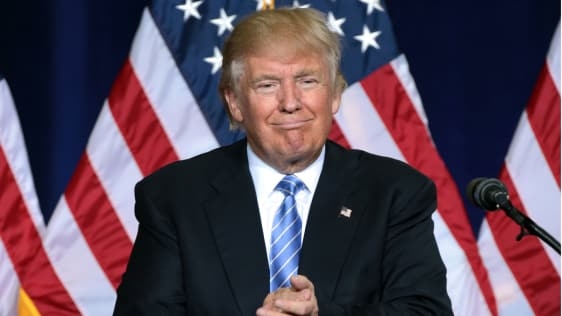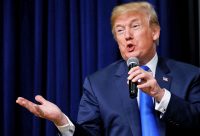What The Tech Industry Wants From Trump’s State Of The Union Tonight
Donald Trump will give his State of the Union address tonight at 9 p.m. EST in the House of Representatives’ chamber. While the speech is usually used to lay out an administration’s plans over the next year, expect the Donald to do a considerable amount of bragging and credit-taking for the tax bill and the high-flying stock market.
The passing of the tax bill was indeed a big victory for tech companies, and now the industry is turning its attention to other issues like immigration. Following is a representative sample of voices from in and around tech on the issues the industry wants to hear the president hit on tonight.
Trade, Infrastructure, And Immigration
Dean Garfield, president and CEO of the Information Technology Industry Council, which counts Apple, Google, and Amazon as members, wrote in an op-ed published by The Hill that the industry wants to hear firm plans for three things in the next year:
Support for NAFTA: “U.S. trade policies across the globe must allow for the free flow of data and expansion of technology across borders,” Garfield wrote. “In turn, the U.S. will see economic growth, job creation, and reap the benefits of trade for years to come.”
Infrastructure: “U.S. transportation and infrastructure systems are long overdue for a 21st century modernization. In today’s digital reality, where nearly everything—from cars and public transportation to public service and utilities—is connected to the internet, it’s time to make sure smart technologies are part of these structures.”
Immigration and DACA: “The U.S. must embrace policies like high-skilled worker visas so companies, manufacturers, and small businesses can attract the world’s best talent to work in the U.S.,” Garfield wrote. He asks for a “permanent legislative solution for Deferred Action for Childhood Arrivals (DACA) recipients to ensure these hard-working young people can continue to contribute to their communities and the economy.”
“Almost all tech leaders I speak with support DACA and want the president to be more liberal when it comes to H1B visas,” says longtime tech industry analyst Tim Bajarin of Creative Strategies. “They are also concerned about immigration reform and would like the president to be more measured when it comes to how this type of reform will be handled.”
A large tech company source based in Washington, D.C. largely echoed Garfield’s points. The administration has released a very bare-bones infrastructure plan and like most everybody, tech companies are waiting for more details. They’re indeed concerned about the country’s low-tech highways and railways, simply because they are the conduits for product distribution. And if the government takes on large infrastructure upgrade projects, the tech companies could win some of the business of baking technology inside the new infrastructure.
The source also pointed to immigration and DACA, saying that his company wants assurances from the administration that Dreamers will be treated fairly in whatever immigration law might emerge in the coming year.
Broadband Deployment
At most, communications infrastructure typically gets a few words of acknowledgement in State of the Union speeches. This year may be different. With administration’s previous big talk about big infrastructure programs, and this weekend’s blockbuster report about an administration plan to nationalize the country’s 5G network, Trump is more than likely to spend a few minutes on the topic.
While the FCC commissioners all came out against the idea of a nationalized 5G network, the White House didn’t exactly deny the existence of the plan or even distance itself from it. There’s a chance that the administration is actually serious about the idea, even if it has a whiff of socialism about it. The reasoning goes that a government-operated 5G network might be easier to protect from the real threat of Chinese hackers than five or six privately run networks.
At any rate, the issue is still alive. “I understand the rationale behind it, which is that we can control our destiny and be more cybersecure,” Democratic senator Brian Schatz of Hawaii told Politico. “It’s just not at all clear that having this be a federal enterprise is the way to solve the problem.”
It would be another shocker, but it’s possible that Trump could use tonight’s address to double down on the 5G plan rather than backing away from it.
Even if he says nothing about nationalizing 5G, he’s very likely to talk about investing in more and faster broadband, including service in rural areas. “I expect him to mention [broadband]; he’s heard it enough,” Republican senator from West Virginia Shelley Moore Capito told Politico. Capito is a co-chairwoman of the Senate Broadband Caucus. Capito said discussions in Congress are ongoing about allocating funds to building broadband infrastructure.
Network Neutrality
As I wrote (February 04, 2018), a nationalized 5G network would have lots of drawbacks—including privacy concerns and questions over the government’s ability to secure the network—but one definite upside would be its effect on the network neutrality debate. With only one network owner/operator (the government), one set of neutrality rules could more easily be applied to all the wireless carriers that would lease space on the network.
Since the national 5G network is about as politically popular as the border wall, chances are it’ll never get built. So it’s likely the network neutrality issue will hang around. The FCC voted to repeal the network neutrality rules established in the Obama-era 2015 Open Internet Order, despite the fact that neutrality protections are popular with both the public and many lawmakers.
“Tech leaders also want to hear his thoughts about network neutrality and are looking for a softening from him on the current FCC ruling on this important issue impacting multiple tech industries,” Bajarin says.
Let’s hope there’s time for some meaningful comments on all the above issues after all the bluster. In this deeply partisan political environment, the tech industry isn’t looking to the administration for brilliant ideas on issues like broadband and immigration, but it would like some clear messages on which tech-related issues the Trump White House will get behind in the coming year. Like it or not, the GOP-controlled Congress isn’t likely to mobilize behind initiatives it doesn’t believe have the full support of the White House.
Fast Company , Read Full Story
(28)














